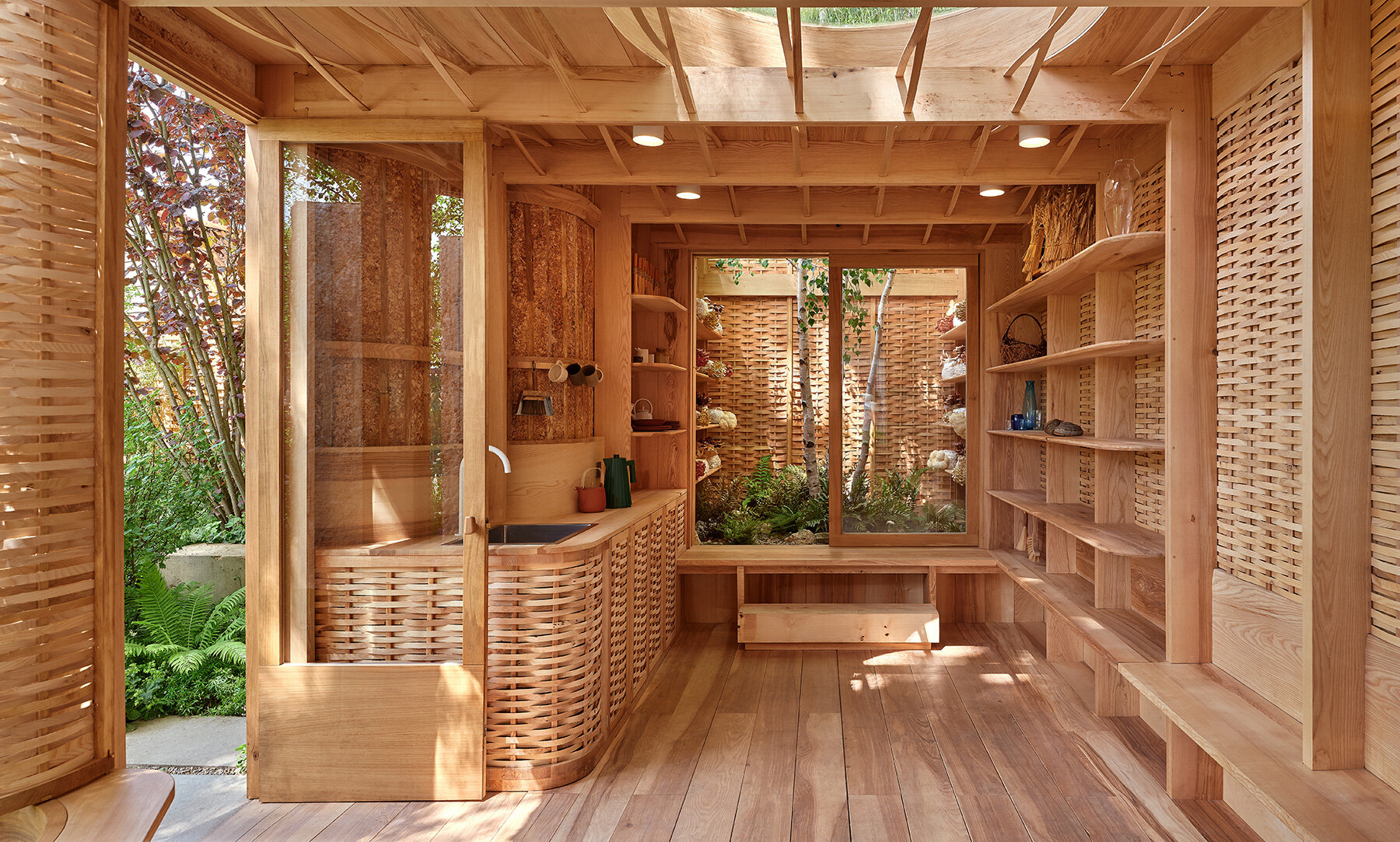an intelligent Garden Alive with Data
In a quiet corner of London’s Chelsea Flower Show, Studio Weave’s Avanade Intelligent Garden pulses beneath the textures of bark and lush foliage. The project gathers and interprets signals from its plants, soil, and air to form an AI-driven ecosystem that listens as much as it grows. The English architects, in collaboration with landscape designer Tom Massey and natural materials expert Sebastian Cox, has created an architectural presence within the garden that reflects both ecological knowledge and digital intuition. The result is a place of learning, adjusting, and responding that’s alive with signals and wrapped in a facade of mushroom mycelium.
This year’s gold medal-winning entry comes from a carefully tuned partnership. Massey’s planting scheme, Cox’s material intelligence, and Studio Weave’s architectural framing find coherence through a shared interest in craft and care. Rather than standing apart, the building acts as a lightly held edge. It folds around the perimeter, creating an inner clearing that functions like a micro-courtyard — a calm interior within the lush density of the Intelligent Garden.

images © Daniel Herendi
a form informed by mushroom mycelium
Studio Weave‘s shed structure within the Intelligent Garden rises from materials that carry their own narratives. Ash timber, harvested from diseased trees in local forests, has been woven and curved to shape the outer skin. Between the slats, natural light lands on the softly undulating surface of mycelium panels. These fungal forms, grown in Sebastian Cox’s Kent workshop from agricultural byproducts, bring both tactile richness and a low-impact material footprint. Together they form a type of garden architecture that feels grown as much as it is built.
This intervention carries more function than its restrained form suggests. It provides shelter and workspace for its gardener-custodians — people tasked with tending the Tom Massey-designed garden and managing the technology embedded within it. Avanade’s AI platform gathers live data on soil health, humidity, and light exposure, offering caretakers a nuanced picture of how each tree and plant responds to its environment. The table inside serves both workshop and observation, reinforcing the idea that care and technology must coexist at a very human scale.

Studio Weave collaborates with Tom Massey and Sebastian Cox to create the Intelligent Garden
studio weave Designs for Disassembly
Tucked within the structure is a shaded, humid corner that leans into the mystery of the mycelium. Here, in conditions designed for growth rather than display, the garden shows its quieter work. Fungal fruiting bodies emerge in their own time, fed by a microclimate that speaks to forest understories. It is a moment of architectural pause, and a reminder that some processes can be invited but never controlled.
Though the Intelligent Garden is a temporary installation, the building’s afterlife has been carefully plotted. Prefabricated in four volumes, it was assembled quickly on-site and will move to Manchester’s Mayfield Park after the show. The building’s construction avoids permanence in favor of adaptability. Every joint, weave, and panel has been designed with disassembly in mind. The entire structure is biodegradable or recyclable, with nothing left as waste. It is, in essence, a compostable building.

locally-sourced Ash and mycelium emphasize sustainability and material storytelling
Beyond the structure, the Intelligent Garden makes a pointed case. Trees in urban areas are under threat from poor planting conditions, neglect, and environmental stress. Nearly half fail within ten years. The garden does not offer a single fix. Instead, it puts forward a layered system — where AI is a tool, not a substitute, for long-term stewardship. Through sensors and predictive models, the technology here helps direct limited resources where they’re most needed, supporting both survival and growth over time.
This is the second year Studio Weave and Tom Massey have collaborated at Chelsea. Their previous entry also received gold, but this year’s work pushes further into a cross-disciplinary space. Known for projects that engage civic and natural contexts with unusual sensitivity, Studio Weave brings architecture into conversation with planting and performance. The firm’s ability to work fluidly between disciplines is evident in how the structure holds the garden without overwhelming it.

the garden integrates AI technology to support the long-term care and survival of urban trees

sensors and AI track soil health and environmental data for optimal growing conditions

an interior courtyard is designated for workshops and quiet observation

the building was prefabricated in modular volumes and designed for reuse after the show

a ‘mushroom parlour’ demonstrates ideal conditions for fungal growth
project info:
name: Avanade Intelligent Garden and Building
architect: Studio Weave | @studioweave
event: Chelsea Flower Show 2025
location: London, United Kingdom
landscape design: Tom Massey | @tommasseyuk
materials: Sebastian Cox | @sebastiancoxltd
digital systems: Avanade Inc. | @avanadeinc
photography: © Daniel Herendi | @neverordinaryview
The post mushrooms and machine learning shape studio weave’s intelligent garden in chelsea appeared first on designboom | architecture & design magazine.